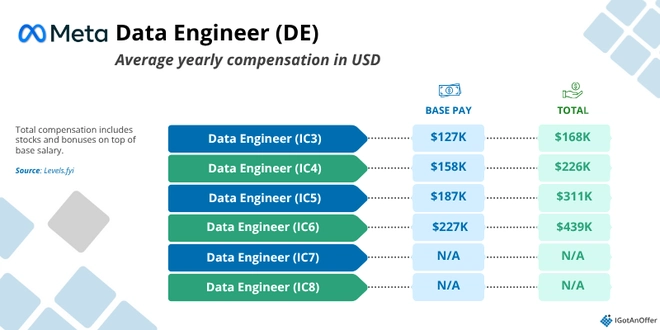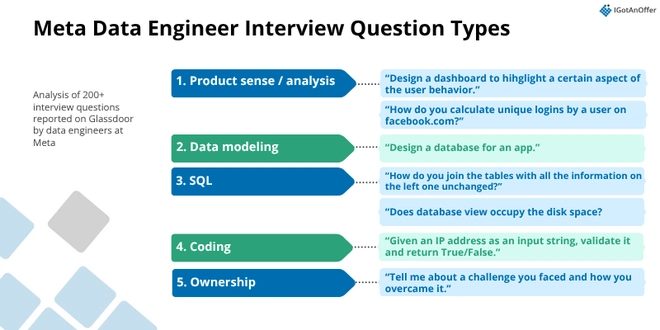Data engineer interviews at Meta are tough to crack. The interview process is rigorous, with challenging, company-specific questions across four or more rounds.
What kinds of questions can you expect? You’ll get business case questions that will test your product sense, data modeling, coding, and SQL skills. You’ll also be asked behavioral questions focused on ownership and your motivation for joining Meta.
The good news? With the right preparation, you can significantly improve your chances of landing that data engineer role at Meta.
That’s why we created this comprehensive guide. We spoke with former Meta data engineers and reviewed real candidate experiences from Glassdoor, along with insights from official Meta resources.
Below, you’ll find a detailed breakdown of the interview process, some sample questions, and expert tips—everything you need to walk into each round with confidence.
Here's an overview of what we will cover:
Click here to practice 1-on-1 with a data engineer ex-interviewer
1. Meta data engineer role and salary↑
Before we cover your data engineer interview at Meta, let’s first take a look at the role.
1.1 What does a Meta data engineer do?
Data engineers at Meta are responsible for gathering and providing data, ensuring that it’s accurate, reliable, and useful for product development strategy and overall business decision-making.
Your goal as a Meta data engineer is to ensure you have data sets available that anticipate future needs, helping to produce a better outcome for Meta’s products.
Meta is a mature company, so plenty of its data infrastructure has already been built. As a new hire, you’ll work on maintaining pipelines, platforms, and processes. It’s a good chance for you to solidify your foundation in Python, SQL, and the tools Meta uses.
Meta’s data tools, according to Jean (ex-Meta data engineer), are “amazing, often homegrown, and always fine-tuned for a perfect developer experience.” With these tools in place, Meta DEs have more opportunity to focus on novel data problem-solving, with performance and efficiency in mind.
You’ll have plenty of help navigating your role along the way, as the DE role at Meta is very well-defined. “The way you have impact is well documented and managers are well equipped to help you,” Jean says.
What skills are required to be a Meta Data Engineer?
Based on an analysis of the current data engineer posts at Meta, the minimum educational requirement for a data engineer is a Bachelor's degree in Computer Science, Computer Engineering, or any relevant technical field. You also meet the minimum requirement if you have equivalent practical experience. Two-plus years of work experience in data engineering and experience with SQL, ETL, Data Modeling, and at least one programming language (e.g., Python, C++, C#, Scala, etc.) are also must-haves.
Aside from technical proficiency, ex-Meta data engineer Jean says that Meta is looking for DE candidates who are collaborative, good communicators, with a strong product sense and user empathy, plus potential for growth.
1.2 Are all data engineer roles at Meta focused on product analytics?
All data engineers at Meta fall under the Product Analytics org, though the scope of work can vary across teams.
“Some roles may be doing more data architecture and pipeline development than others,” says Ramprasad (ex-Meta data engineer). “But the interview structure is the same for IC3 through IC5. For IC6 roles, there will be additional architecture and leadership rounds.”
In most cases, data engineers at Meta spend their time writing SQL queries, building dashboards, and developing datasets that help product teams track and interpret key metrics. The work often resembles what other companies call ‘analytics engineering’.
That said, some teams focus more on infrastructure and platforms, designing large-scale data processing systems, streamlining pipelines, or building services that deliver data into analytics tools.
Some candidate reports on Reddit suggest the role is often pipeline-centric, with occasional opportunities to work on efficiency or infrastructure projects such as improving logging systems or scaling pipelines.
For your interview prep, it’s safest to assume the preparation will look similar to a Meta data engineer product analytics interview, unless the job posting specifies otherwise. This means focusing your prep on product sense/analytics, data modeling, coding, and SQL – all of which we’ll discuss in detail below.
1.2 How much does a Meta Data Engineer make?
Based on Glassdoor data, the average data engineer salary at Meta is $269,000/year, which is 51% higher than the estimated average salary of a data engineer in the US.
Below you can see the average salary and compensation of the different data engineer levels at Meta US, as of September 2025, based on Levels.fyi.

We presume you already know the level you are applying for, but it’s still good to double-check with your recruiter. They should be able to advise you on which level you’re being evaluated.
Ultimately, how you do in your interviews will help determine what you’ll be offered. That’s why hiring one of our ex-Meta interview coaches can provide such a significant return on investment.
And if you do get an offer, remember: compensation packages are always negotiable, even at Meta. So don’t be afraid to ask for more.
Read our guide on Meta salary negotiation for practical tips. If you need expert help practicing what you’ve learned, consider booking a session with one of our salary negotiation coaches.
2. Meta data engineer interview process and timeline↑
2.1 What steps to expect
What's the interview process at Meta for the data engineer role? It usually takes around two months and follows these steps:
- Resume screen
- Recruiter phone screen (30-45 minutes)
- Technical screen (1 hour)
- Full loop round (4 interviews: 3 hours on technical, .5 hour on behavioral)
Let’s take a look at each of those steps in a bit more detail.
2.1.1 Resume screen
First, recruiters will look at your resume and assess if your experience matches the open position.
This is the most competitive step in the process, as millions of candidates do not make it past this stage.
If you’ve yet to polish or write your resume, start with some guidance from real Meta resume examples and our tech resume guide.
For expert feedback, book one of our resume reviewers, many of whom are ex-Meta recruiters. They can help you determine what achievements to focus on (or ignore), how to fine-tune your bullet points, and more.
If you do have a connection to someone at Meta, getting an employee referral may increase your chances of getting into the interview process.
2.1.2 Recruiter phone screen
In most cases, you'll start your interview process with Meta by talking to an HR recruiter on the phone for 30-45 minutes.
They want to confirm that you've got a chance of getting the job at all, so be prepared to explain your background and why you’re a good fit at Meta.
Expect typical behavioral and resume questions like "Tell me about yourself", "Why Meta?", as well as some SQL and data structure questions.
If you get past this first HR screen, the recruiter will then schedule you for a technical screen with a Meta engineer.
One great thing about Meta is that they’re very transparent about their recruiting process. Expect your contact to walk you through the remaining steps in the hiring process and share with you a helpful email listing resources you can use to prepare.
2.1.3 Technical screen
After clearing the HR screen, you’ll have an hour-long technical screen with a peer or a hiring manager.
You’ll spend up to 25 minutes each on SQL questions and coding questions. You can get up to 5 questions for each focus area.
For this screening round, your goal is to demonstrate speed and efficiency. So be sure to use time constraints when practicing.
It’s up to you which programming language you use. Just be sure to let your recruiter know your preferred language beforehand.
You'll use a simple online code editor without syntax highlighting or auto-completion (e.g., CoderPad) and sometimes a virtual whiteboard tool (e.g., Excalidraw). Practice using one so you’ll be familiar with it during your screening and full interview loop.
Your recruiter will send you your custom CoderPad link once you confirm your interview schedule. Join the link minutes before your screening schedule so you’ll have time to fix any issues and still be on time.
Take a look at the official Data Engineer initial screen prep guide by Meta for more information on this stage of the interview process.
2.1.4 Full loop round
The final stage in the interview process is a full loop round conducted virtually through video conferencing.
Based on the official Meta DE onsite prep guide, you can expect four interviews in total: 3 hour-long technical interviews and one 30-minute behavioral interview focused on ownership.
The 3 technical interviews will be case studies of typical product challenges that Meta normally solves with data. They will cover the following focus areas:
- Product sense/analysis
- Data modeling
- ETL (SQL & Python)
We’ll look into each question category in more detail in Section 3.
2.3 What happens behind the scenes
Throughout the interview process at Meta, the recruiter usually plays the role of "facilitator" and moves the process from one stage to the next. Here's an overview of what typically happens behind the scenes:
- After the initial screen, the interviewer(s) you've talked to submit their ratings and notes to the internal system. Your recruiter then reviews the feedback and decides to move you to the onsite interviews or not, depending on how well you've done.
- After the Full Loop, the interviewers will make a recommendation, and the recruiter compiles your "packet" (interview feedback, resume, referrals, etc.). If they think you can get the job, they will present your case at the next candidate review meeting.
- Candidate review meetings are used to assess all candidates who have recently finished their Full Loops and are close to getting an offer. Your packet will be analyzed, and possible concerns will be discussed. Your interviewers are invited to join your candidate review meeting but will usually only attend if there's a strong disagreement in the grades you received (e.g., 2 no-hires, 3 hires). At the end of the candidate review meeting, a hire/no-hire recommendation is made for consideration by the hiring committee.
- The hiring committee includes senior leaders from across Meta. This step is usually a formality, and the committee follows the recommendation of the candidate review meeting. The main focus is on fine-tuning the exact level and, therefore, the compensation you will be offered.
It's important to note that hiring managers and people who refer you have little influence on the overall process. They can help you get an interview at the beginning, but that's about it.
3. Meta data engineer example questions↑
Now let’s get into some real Meta data engineer example questions.

In this section, we’ve gathered real questions reported by Meta candidates on Glassdoor.
We’ve categorized them based on the categories in Meta’s official DE onsite guide: product sense/analysis, data modeling, SQL, coding, and ownership.
Note that we’ve changed the grammar and phrasing in some places to make the questions easier to understand.
Let’s get into it.
3.1 Product sense questions
Meta is a very product-focused company, and DEs play an important role in its product development strategy. That’s why Meta tests candidates for product sense in all technical interviews.
To ace product sense questions, you'll need to demonstrate strong product awareness and an ability to hold strategic conversations about a product and its possibilities.
You’ll need to show that you can think critically about the needs of a product and give solid technical solutions.
As part of your practice, you might want to check out the metrics that companies similar to Meta use. You can extract this information by looking at their financial statements.
Let’s take a look at some real examples of product sense questions that we found in the Glassdoor data.
Example product sense questions asked by Meta in data engineer interviews
- Design a dashboard to highlight a certain aspect of the user behavior.
- How do you calculate unique logins by a user on facebook.com?
- How would you rate the popularity of a video posted online?
- How would you check if Facebook should change something in the newsfeed? How would you define the KPI in this case?
- Design an experiment to test whether a certain feature generates conversation.
- How did you influence a product decision at previous roles using data?
Check out our guide on Meta product sense interviews. It’s written for PM candidates, but still has plenty of useful information to help you prepare.
3.2 Data modeling questions
Meta is built on collecting huge amounts of data. Modeling that data in the best way possible is therefore very important.
During your data modeling round, you’ll be asked to brainstorm the data needs of one of Meta’s products. You’ll then need to design a data mart to support analytics use cases and write select SQL statements to produce specific results.
Anticipate follow-up questions on edge cases and be prepared to talk about how you would optimize your proposed solution.
Let’s take a look at some real examples of data modeling questions that we found in the Glassdoor data.
Example data modeling questions asked by Meta in data engineer interviews
- Present a design of a gaming company database.
- Design a database for an app.
- Design a relational database for a ride-sharing app.
- Given data, design a table schema for this data to be used by a data scientist to query metrics such as process with max average elapsed time, and so they can plot each process.
- Create DDL (table and foreign keys) for several tables in a provided ERD. The ERD contains at least one many-to-many relationship.
- Design a database schema for an app which provides a ride-sharing service, explain which tables, field types, and keys will need to be saved.
- Design a model for a gaming company such as Epic Games.
- Design a scalable data pipeline for processing real-time streaming data from multiple sources, ensuring data integrity, fault tolerance, and efficiency.
- What is the difference between a data lake and a data warehouse?
3.3 SQL questions
With Meta’s backend handling billions of data fetch operations each day, SQL knowledge is very important for the company's data engineers. That’s why they include SQL questions both in the technical screening and full loop interviews.
During this round, the interviewer will test your basic SQL constructs knowledge. You’ll need to show you know how to use joins, aggregate functions, analytical functions, set operators, and subqueries, while thinking about efficiency and scalability.
Let’s take a look at some real examples of SQL questions that we found in the Glassdoor data.
Example SQL questions asked by Meta in data engineer interviews
- How do you join two tables with all the information on the left one unchanged?
- Does database view occupy the disk space?
- Given full authority to "make it work", import a large data set with duplicates into a warehouse while meeting the requirements of a business intelligence designer for query speed.
- Find the top 10 colleges/companies that an average social person interacts with.
- The ORDER BY command in SQL is automatically set in what format if you didn't set it: Ascending or Descending?
- When you want to delete or add a column of a table in a database, what command will you use?
- What command would you want to use if you want to keep all the info on the left table?
- If you want to combine two columns after removing two duplicates, would you use UNION or UNION ALL?
- What is the term used to select non-duplicates in SQL?
- Given a raw data table, how would you write the SQL to perform the ETL to get data into a desired format?
- Perform a merge-sort with SQL only.
- A table has two data entries every day for # of apples and oranges sold. Write a query to get the difference between the apples and oranges sold on a given day.
- Given a database schema showing product sales: calculate what percent of our sales transactions had a valid promotion applied. And what % of sales happened on the first and last day of the promotion?
- Display the most common name in a table.
- Write a query that returns product_family, units_sold, percentage of promoted.
- Write a query that returns percentage of unsold product_category.
- Write a function to count the number of times each character appears in a string and rewrite the string in that format.
- Given a table of users and whom they sent friend requests to, what is the average number of friend requests sent in the last week?
- Given a schema progressively ask SQL queries ranging from basic to window functions.
- Find how many books are in good condition and not returned. What percentage of those copies have been renewed more than two times?
- Using four tables (author, transaction, customer, payment), calculate the total value of sales and the number of unique paying customers, grouped and sorted in descending order by payment type.
- Group by payment type to calculate total sales and the number of unique customers.
- Using four tables (sales, books, authors, customers), create queries with joins and aggregations to answer business questions:
- Retrieve the top 10 customers who purchased the highest total number of books in 2019, excluding refunded sales.
- Calculate the average total purchase amount segmented by customer reward membership status and whether the purchase was made in-season or out-of-season (Season = after Nov 15).
- Determine what percentage of total book sales (by revenue) is contributed by the top 5 most expensive books.
- Identify customers who purchased on more than one distinct day and bought over three books across their first and last purchase dates.
3.4 Coding questions
Meta data engineers solve some of the company’s biggest challenges with code. So your interviewers want to make sure you’ve got the necessary problem-solving skills and that you can think in a structured way.
During your Meta coding interview, you’ll need to show that you know how to manipulate data structures, use dictionaries, loops, and lists.
You’ll also need to demonstrate a good understanding of string, set operations, etc, in your coding language of choice.
You’ll need to provide accurate, bug-free, efficient, and well-thought-out code, sharing your thoughts out loud while you work through it on a whiteboard (or online equivalent).
Let’s take a look at some real examples of coding questions that we found in the Glassdoor data.
Example coding questions asked by Meta in data engineer interviews
- Given a two-dimensional list, for example [ [2,3],[3,4],[5]] person 2 is friends with 3 etc, find how many friends each person has. Note, one person has no friends. (Solution)
- Can you do the following without using subquery?: {1,None,1,2,None} --> [1,1,1,2,2] Ensure you take care of case input[None] which means None object. (Solution)
- Complete a function that returns a list containing all the mismatched words (case sensitive) between two given input strings # For example: # - string 1: "Firstly this is the first string" # - string 2: "Next is the second string" # # - output : ['Firstly', 'this', 'first', 'Next', 'second'].
-
Complete a function that returns the number of times a given character occurs in the given string. (Solution)
# For example:
# - input string = "mississippi"
# - char = "s"
#
# - output : 4 -
Given an array containing None values fill in the None values with most recent non None value in the array. For example: input array: [1,None,2,3,None,None,5,None] # - output array: [1,1,2,3,3,3,5,5].
-
Complete a function that returns a list containing all the mismatched words (case sensitive) between two given input strings # For example: string 1: "Firstly this is the first string" # - string 2: "Next is the second string" # # - output : ['Firstly', 'this', 'first', 'Next', 'second'].
-
Given an array of integers, we would like to determine whether the array is monotonic (non-decreasing/non-increasing) or not.(Solution)
- Given two sentences, construct an array that has the words that appear in one sentence and not the other. (Solution)
- Given an IP address as an input string, validate it and return True/False. (Solution)
- Count the neighbors of each node in a graph. Input graph is a multi-dimensional list. (Solution)
- Given a dictionary, print the key for nth highest value present in the dict. If there are more than 1 record present for nth highest value then sort the key and print the first one.
- Flatten a nested dictionary. (Solution)
- You have a 2-D array of friends like [[A,B],[A,C],[B,D],[B,C],[R,M], [S],[P], [A]]. Write a function that creates a dictionary of how many friends each person has. People can have 0 to many friends. However, there won't be repeat relationships like [A,B] and [B,A] and neither will there be more than 2 people in a relationship.
- What is a loop that goes on forever? (Solution)
- Recursively parse a string for a pattern that can be either 1 or 2 characters long. (Solution)
- Write a simple spell-checking engine.
- Given two sentences, you have to print the words that are not present in either of the sentences. (If one word is present twice in 1st sentence but not present in 2nd sentence then you have to print that word too).
- Write a function to count the number of times each character appears in a string and rewrite the string in that format. (Solution)
- Match all words in a document against a name dictionary and anonymize them using a hash.
- Find the second-highest salary from an employee table. (Solution)
- Calculate the average book price from a list of prices. (Solution)
- Determine the maximum number of unique books that can be bought, given an array of book prices and a budget (each book can be purchased only once). (Solution)
- From a given list of book titles, identify sequels (e.g., ['GOT', 'Troy', 'Batman', 'Batman Returns'] → ['Batman Returns']).
- Given a dictionary of book reviews with reviews as a list of strings and books as keys, find the most frequent review across books. Example: D = {a: [bal, bla], b: [bla, tla, dla], c: [bla, tra, ura]} → bla is most frequent.
- You are given a dictionary where the key is the location of a bookstore and the value is a list of reviews as strings. Return the most frequent review across all locations after removing duplicates within each location. (Solution)
- Given a number, return the largest odd number that can be formed by rearranging its digits. (Solution)
- Given a list of workshops, return the maximum total number of classes hosted across any two consecutive years that had at least one workshop each. (Solution)
- Given a number (positive or negative), find the smallest possible number you can form with it (no leading zeroes). (Solution)
Check out our articles on Meta coding interviews and coding interview examples (in Python, Java, C++, SQL, and others) for more practice questions.
3.5 Ownership questions
Meta data engineers need more than just strong technical skills. They need soft skills that enable them to leverage this technical knowledge.
The ownership questions that you’ll be asked are what we call "behavioral" questions. What makes this specific to the role is that they’re looking to see if you have experience taking initiative and influencing your fellow engineers and cross-functional partners.
Below we've listed some frequent ownership questions that Meta tends to ask, according to data from Glassdoor.
Example ownership questions asked by Meta in data engineer interviews
- Tell me about yourself.
- Tell me about a challenge you faced and how you overcame it.
- Why data engineering?
- Why Meta?
- Tell me about a project you have worked on.
- Describe a situation where you did not agree with the stakeholders. How did you handle it?
- What product would you want to most work on and why? What would you do if you worked on that project?
- What is the most challenging project that you have ever worked on?
- If you have conflicts with your manager, what would you do?
- What are 3 things you want to accomplish in the first 3 months?
Check out our guide to Meta behavioral interviews to learn more.
4. Meta data engineer interviewing tips↑
You might be a fantastic data engineer, but unfortunately, that won’t necessarily be enough to ace your interviews at Meta. Interviewing is a skill in itself that you need to learn.
Let’s look at some key tips to make sure you approach your interviews in the right way.
4.1 Ask clarifying questions
Often the questions you’ll be asked will be quite ambiguous, so make sure you ask questions that can help you clarify and understand the problem.
4.2 Be conversational and concise
According to ex-Meta data engineer Jean, aside from technical proficiency, Meta is looking for DE candidates who are good communicators. So make sure you approach the interview like a conversation.
That said, don’t let your answers meander. Keep your answers concise and prioritize speed and efficiency to give your interviewers a chance to see all your skill sets.
4.3 Think out loud
You need to walk your interviewer through your thought process. Meta recommends that you talk even while coding as they want to know how you think.
Your interviewer may also give you hints about whether you’re on the right track or not.
Be alert for these, and be ready to pivot once you’ve gotten the prompt. This shows you’re eager to learn and listen well to feedback.
4.4 State and check assumptions
You need to explicitly state assumptions, explain why you’re making them, and check with your interviewer to see if those assumptions are reasonable.
4.5 Present multiple possible solutions
In terms of problem-solving, Meta wants data engineers to choose and present solutions with performance and efficiency in mind.
Your interviewers will be looking out for how you "compare and contrast different options and justify the rationale behind your decisions," Karthik says.
4.6 Be honest and authentic
Be genuine in your responses. Meta interviewers appreciate authenticity and honesty.
If you faced challenges or setbacks, discuss how you improved and learned from them.
When talking about failure, don’t try to hide your mistakes or frame a weakness as a strength. Instead, show what you learned and how the failure helped you grow.
4.7 Center on Meta’s culture
Familiarize yourself with Meta’s core values and align your behavioral responses with them.
Meta values certain attributes such as comfort with ambiguity, agility, collaborative nature, and a sense of urgency.
Also, know that you’ll be assessed on your culture fit even in your technical interviews. For example, listening well to feedback and applying it during your coding questions shows your agility and collaboration skills.
4.8 Brute force, then iterate
When coding, don’t necessarily go for the perfect solution straight away. Meta recommends that you first try and find a solution that works, then iterate to refine your answer.
4.9 Keep your code organized
During your coding round, your interviewer wants to see that your code has captured the right logical structure.
Make sure to keep your code organized so they won’t have a hard time understanding what you’ve written.
5. Preparation plan↑
Now that you know what questions to expect, let's focus on how to prepare.
It's no secret that the performance bar at Meta is high. Some people even go as far as quitting their job to prepare for interviews full-time.
This is obviously extreme and not what we recommend doing, but it shows how much effort some candidates are ready to put in.
Below, we've listed the four steps we recommend taking to prepare as efficiently as possible.
5.1 Learn about Meta’s culture
Most candidates fail to do this. But before investing tens of hours preparing for an interview at Meta, you should take some time to make sure it's actually the right company for you.
Meta is prestigious and it's therefore tempting to ignore that step completely. But in our experience, the prestige in itself won't make you happy day-to-day. It's the type of work and the people you work with that will.
If you know engineers who work at Meta (or used to), it's a good idea to talk to them to understand what the culture is like. In addition, we would recommend reading the following:
- Meta's 6 core values
- Facebook’s hacker culture (by Mark Zuckerberg, via Wired)
- Meta annual reports and strategy presentations (by Meta)
- Meta's approach to tech trends (by CB Insights)
- Meta org culture analysis (by Panmore Institute)
- Data engineering at Meta: High-level overview of the internal tech stack (by Analytics at Meta)
Meta recommends taking a look at these resources when you prepare:
5.2 Practice by yourself
To help you organize your preparation, make sure to read Meta’s own guide to the data engineer onsite interview.
Then you’ll want to start digging a bit deeper into each of the five types of questions you’ll be facing (product sense, data modeling, SQL, coding, and ownership).
Below, we’ve gathered a mix of resources to get you started, with recommendations from us and Meta.
Product sense:
We recommend looking at Meta’s products and thinking hard about their metrics as part of your prep. Here are a few more helpful resources:
- Crack Metric/Business Case/Product Sense Problems for Data Scientists (by Emma Ding)
- How to Deep Dive in Your Product Funnel Performance with GA and Data Studio
- Most Important Product Metrics
- How Would You Measure the Success or Failure of a Product Feature?
- How to Crack Product Sense Interviews (by IGotAnOffer)
Data modeling:
To practice, take a main product from a top tech company. Try to work out how you would model each of its functions. Create logging designs and design data models. Here are some resources to help you brush up on core concepts:
- Learn Data Modeling
- Data Modeling in Big Data
- Data Model
- Data Mart
- Dimensional Modeling
- Dimension Modeling Techniques
- Denormalization
SQL:
Former candidates recommend practicing medium/hard SQL on Leetcode, as SQL questions at Meta tend to get complex. Here are a few more resources for your review:
Coding:
We recommend practicing coding problems under strict time constraints. Start your review with our Meta coding interview guide. Here are a few more resources from Meta:
Ownership:
We recommend listing previous experiences that demonstrate how you’ve taken initiative and exercised your influence with collaborators. Then structure your stories with the step-by-step method we propose in our guide to Meta behavioral interview questions.
Finally, we recommend checking out our article on what a real Meta interview experience is like. It features stories and great prep strategies from successful candidates we’ve worked with.
Once you’re in command of the subject matter, you’ll want to practice answering questions.
But by yourself, you can’t simulate thinking on your feet or the pressure of performing in front of a stranger. Plus, there are no unexpected follow-up questions and no feedback.
That’s why many candidates try to practice with friends or peers.
5.3 Practice with peers
If you have friends or peers who can do mock interviews with you, that's an option worth trying. It’s free, but be warned, you may come up against the following problems:
- It’s hard to know if the feedback you get is accurate
- They’re unlikely to have insider knowledge of interviews at your target company
- On peer platforms, people often waste your time by not showing up
For those reasons, many candidates skip peer mock interviews and go straight to mock interviews with an expert.
5.4 Practice with experienced Meta interviewers
In our experience, practicing real interviews with experts who can give you company-specific feedback makes a huge difference.
Find a Meta data engineering coach so you can:
- Test yourself under real interview conditions
- Get accurate feedback from a real expert
- Build your confidence
- Get company-specific insights
- Learn how to tell the right stories, better.
- Save time by focusing your preparation
Landing a job at a big tech company often results in a $50,000 per year or more increase in total compensation. In our experience, three or four coaching sessions worth ~$500 will make a significant difference in your ability to land the job. That’s an ROI of 100x!















